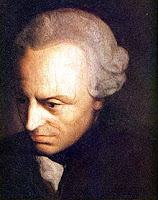 Immaneul Kant
Immaneul Kant Now there's a great topic. "How Immanuel Kant Foresaw A Course in Miracles." I'm not an academic, but lately I have been reviewing a number of books from the Positive Psychology genre for a particular client who publishes my book reviews as resource material for her clients. At this moment I'm reading "Stumbling On Happiness" by Daniel Gilbert, Ph.D. He weaves an amazing story that shows how inept we are at forecasting our own future happiness. Even though it's a fascinating topic that he treats in depth with great, dry humor, it is not the issue I want to address here.
Instead, this post is about 18th century philosopher, Immanuel Kant, born in 1724. Prior to Kant's birth, philosopher John Locke described the theory of realism in 1698. Locke thought that our senses are essentially "perfect" -- that what we perceive is truth.
Here's what John Locke said in "An Essay Concerning Human Understanding" (my emphasis added):
"When our senses do actually convey into our understandings any idea, we cannot but be satisfied that there doth something at that time really exist without us, which doth affect our senses, and by them give notice of itself to our apprehensive faculties, and actually produce that idea which we then perceive: and we cannot so far distrust their testimony, as to doubt that such collections of simple ideas as we have observed by our senses to be united together, do really exist together."
In a nutshell, according to John Locke, if we see it, hear it, perceive it ... then it must be true ("really exist without us"). That understanding became known as "realism." Then comes along Mr. Kant about one hundred years later who countered with the theory now known as "idealism."
Kant disagreed. Here's a quote from Dr. Gilbert's book (my emphasis added) that summarized Immaneul Kant's position:
"Kant's new theory of idealism claimed that our perceptions are not the results of a physiological process by which our eyes somehow transmit an image of the world into our brains, but rather, they are the result of a psychological process that combines what our eyes see with what we already think, feel, know, want and believe, and then uses this combination of sensory information and preexisting knowledge to construct our perception of reality."
Now doesn't that sound a lot like ACIM? In the Introduction to Chapter 21: REASON AND PERCEPTION, the Course says (again with my emphasis added):
1 Projection makes perception. The world you see is what you gave it, nothing more than that. But though it is no more than that, it is not less. Therefore, to you it is important. It is the witness to your state of mind, the outside picture of an inward condition. As a man thinketh, so does he perceive. Therefore, seek not to change the world, but choose to change your mind about the world. Perception is a result and not a cause.
What we think with our ego minds (inward condition) is what we project out into the the world of form around us. Said another way, "What we project is what we perceive." Kant could not have been more in harmony with the Course if he were a contemporary student. Bravo! I really like to find "old wisdom" that reflects the teachings of the Course, and this one is exemplary!
So...all scholarly pursuits aside, this is just another reminder from Lesson 32:
You are not the victim of the world you see because you invented it. And...
I have invented this situation as I see it.
In my personal life "I have invented" some horrendous situations. Thankfully, the Course is teaching me how to focus on Love rather than my ego ramblings and, as "time" passes, wondrous new understandings are being given to me. Again I say, Thank You Father.